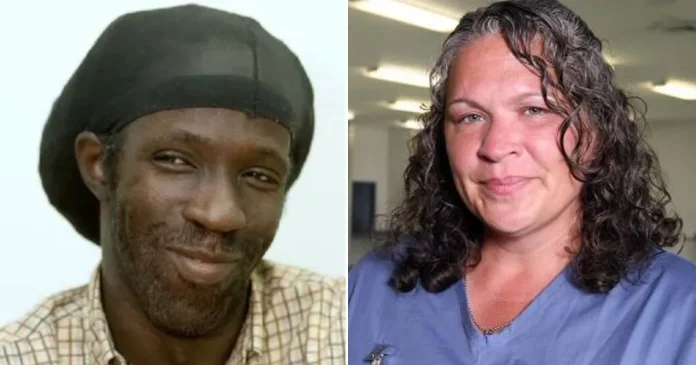After winning the lottery, many think life will be easier, but for a man who won $30million (£26m), it was just the beginning of his troubles, which would culminate in his body being found buried under concrete in a back garden.
Abraham Lee Shakespeare, 43, won the Florida lottery jackpot in 2006. He collected his winnings publicly, but soon took a dislike to the consequences of the life-changing win. Along with the money came a string of side effects and bad decisions, with Shakespeare even telling his brother, Robert Brown, on one occasion he would have been better off having not won anything.
“‘I’d have been better off broke. He said that to me all the time,” Brown told St Augustine Record in 2010 after Shakespeare’s body was found.
When he won the jackpot, Shakespeare was an assistant truck driver living with his mum in rural Plant Town, east of Tampa. He was described as being “barely literate” and “extremely generous” with his new wealth – something people took advantage of.
Samuel Jones, who had known Shakespeare since they were both 12, said: “He really didn’t understand it at all. It was moving so fast. It changed his life in a bad way.”
Mr Jones explained how after taking his lump sum payment of around $30m in winnings, people began to gather outside the home Shakespeare shared with his mum, asking for money.
He said Shakespeare would tell him: “I thought all these people were my friends, but then I realised all they want is just money.”
He was right about at least one of those friends, who would go to extreme lengths to get her hands on a share of the cash.
Shakespeare met Dorice Donegan Moore, 49, known as ‘DeeDee’ in 2007, around a year after collecting his winnings. It was shortly after Shakespeare bought a million-dollar home in Lakeland, Polk County.
She told Shakespeare she wanted to write a book about his life, with officials saying she was just interested in the money. She ended up becoming something of a financial advisor to Shakespeare.
Records show Moore’s company, American Medical Professionals, bought Shakespeare’s home for $655,000 in January 2009.
The following month, she helped him open a company – giving herself the ability to sign for money, including a $1m withdrawal according to detectives.
She told police Shakespeare gave her the cash as a gift, which she used to buy a Hummer, a Corvette and a truck, as well as using it to fund a holiday.
Polk County Sheriff Grady Judd called Moore a “con artist” saying: “DeeDee Moore has cheated Abraham Shakespeare out of his money, and possibly his life” after his body was found.
Shakespeare was last seen in April 2009. His family thought, and hoped, he had jetted off somewhere with his winnings to relax on a beach.
Moore told local paper the Lakeland Ledger he was “laying low” because of people hounding him for a share of his winnings. She also told the paper she helped him disappear.
However, detectives said she tried to make it appear he was alive for months, even using his phone to text relatives and friends. They also said Moore paid one of Shakespeare’s relatives $5,000 to deliver a birthday card to Shakespeare’s mum, suggesting it had come from her son.
On January 25, 2010, Shakespeare was found shot to death, buried under concrete in the back garden of a home previously bought by Moore.
In an interrogation the following month, Moore denied killing Shakespeare – saying it was drug dealers. Digging further into her story, investigators spoke to her ex-husband.
He told them on the night of Shakespeare’s murder, Moore had him use a machine to dig a hole in the back garden and fill it in after sundown. He claimed to have no idea there was a body at the bottom and authorities determined he was not involved in the murder.
Authorities went back to Moore, whose story began to fall apart. Prosecutors charged her with murder.
In 2012 a jury found Moore guilty of first-degree murder, with the judge sentencing her to life in prison without the possibility of parole. She was incarcerated at the Lowe Correctional Facility in Ocala, Florida.
In a recent interview from prison, Moore maintained her innocence, and admitted she still thinks about Shakespeare. She said: “It was wrong. There was no reason for him to pass away over money but for them to lie in public and say that I took his money… the whole situation was so stupid.”
Despite her involvement in the death of Shakespeare, Moore has advocated for lottery winners to have their identity protected for at least six months after they cash in their tickets.
She told CBS News: “It puts a target on them.”
Florida Governor Ron DeSantis passed a law in May 2022, allowing the names of those who win in excess of $250,000 to remain permanently confidential. For those who win at least $600, their names are released after 90 days.
At Reach and across our entities we and our partners use information collected through cookies and other identifiers from your device to improve experience on our site, analyse how it is used and to show personalised advertising. You can opt out of the sale or sharing of your data, at any time clicking the “Do Not Sell or Share my Data” button at the bottom of the webpage. Please note that your preferences are browser specific. Use of our website and any of our services represents your acceptance of the use of cookies and consent to the practices described in our Privacy Notice and Cookie Notice.





